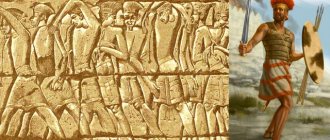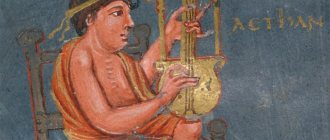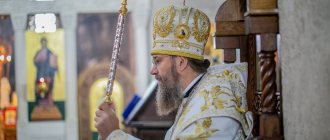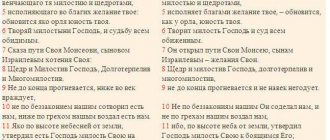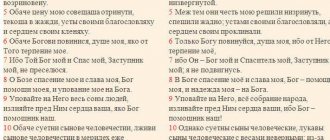The Lord is omnipotent. According to His desire, the world was created, and people became its inhabitants because they committed original sin. However, God did not abandon people. He chose one people for himself, who, by agreement, led the way and provided him with a happy life until he was tempted by sin.
The theme of Psalm 135 is about the eternal love of the Almighty for people. People, in turn, must humbly accept His benefits and pray for the glory of the Creator. More details will be given below.
Text of prayer 135
The prayer is read in Church Slavonic if there is a service in the church. This is done for parishioners who want to get closer to the Kingdom of God. The text in Russian helps you understand the plot; you can read it at home.
In Church Slavonic with accents
In Russian
Alleluia, 134
1 Praise the name of the Lord, praise you, servants of the Lord,
2 standing in the temple of the Lord, in the courts of the house of our God.
3 Praise the Lord, for the Lord is good; sing praises to His name, for it is good:
4 For the Lord hath chosen Jacob for himself, Israel for his own possession.
5 For I have known that the Lord is great, and our Lord is above all gods.
6 Whatever the Lord pleases, create in the heavens and on the earth, in the seas and in all the deeps.
7 Bringing up the clouds from the last of the earth, making lightning into rain, bringing down the winds from Your treasures.
8 Who shall smite the firstborn of Egypt, from man to beast.
9 He sent signs and wonders among you, Egypt, against Pharaoh and against all his servants.
10 Smite many tongues and slay mighty kings:
11 Zion king of the Amorites, and Og king of Bashan, and all the kingdom of Canaan,
12 And he gave the land their heritage, a heritage for Israel his people.
13 O Lord, Thy name is for ever, and Thy memorial forever and ever:
14 For the Lord will judge His people, and He will pray for His servants.
15 Idols of the tongue, silver and gold, the work of men's hands.
16 They have lips and do not speak, they have eyes and do not see,
17 They have ears and will not hear, for there is spirit in their mouth.
18 May those who do things be like them, and all who trust in her will be like them.
19 O house of Israel, bless the Lord; house of Aaron, bless the Lord; house of Levi, bless the Lord.
20 You who fear the Lord, bless the Lord.
21 Blessed be the Lord from Zion, who dwelleth in Jerusalem.
History of writing
It is difficult to determine the reason for writing the psalm, but one assumption can be made. Most likely, the event was associated with the construction of the second Jerusalem temple. This event was truly important for the Jews, for they sought God to atone for the sins of the past.
A distinctive feature of the chant is the presence of a refrain. The people responded to each verse with a refrain. When the priests and Levites read the song, the Jews only formed an organic part of the liturgical song.
Psalm 135 is also called “The Great Hallel.” It was considered the most popular among Jews and was performed on the most significant Jewish holidays. The praise was always sincere and came from the heart. For the Jews, singing the song was a symbol of the unity of all Israelites.
Why read Psalm 135
In the church, Psalm 135 is sung in Church Slavonic. This language has all the necessary depth and melodiousness in order to captivate parishioners and adjust their way of thinking in the right way. With the help of song in the Orthodox tradition, the mercy of the Lord is promoted, which exists in an unchanged form, but always reveals itself to the world through His blessing.
Each verse of the work is full of ideas that the Lord is all-merciful, and faith in Him works extraordinary miracles.
Cell readings (at home) are allowed in Russian. It can be read for any occasion, but it can be called significant, for example, preparing for a trip of a loved one. When danger haunts, prayer gains power.
The stronger the believer’s feelings, the more perfect the prayer will be. You can pray not only to get something. Regular praise to the Lord bestows blessings that attract good fortune and make life happier.
135:1,2 A psalm calling to praise the God of Israel. But it was not without reason that he called for the glorification of Jehovah: there were good reasons for this, to which this song is dedicated in the temple of JehovahPraise the Lord, for He is good, for His mercy endures forever. 2 Praise the God of gods, for His mercy endures forever.
The mercy of the God of Israel is one of the most important qualities of His personality. He is the God of gods, that is, priority belongs to the God of Israel and preference in worship should be given only to this God. All other gods (spirits) will fail if they decide to compete with him in strength. Using the example of the Egyptian magicians, behind whom stood the demons - the gods of Egypt, God clearly showed what they stand for if they cannot protect their worshipers from the power of the God of Israel.
135:3 Praise the Lord of lords, for His mercy endures forever; Lord of lords means the most important above all lords: this is how society, for example, the earth, is structured that the bulk of the people need to be led by someone for their own good in order to avoid anarchy and unrest. The God of Israel is superior to all earthly leaders combined - with His wisdom, power and ability to lead humanity.
135:4,5 Him who alone does great wonders, for His mercy endures forever; 5 Who created the heavens in wisdom, for His mercy endures forever;
The God of Israel is the Creator, therefore it is not difficult for Him to perform great miracles, with the help of which He introduces Himself to humanity.
135:6-9 He established the earth on the waters, for His mercy endures forever; 7 He made great lights, for His mercy endures forever; 8 The sun is to rule the day, for His mercy endures forever; 9 the moon and stars to rule the night, for His mercy endures forever; The process of creation of the earthly world order, accompanied by the formation of the earth, luminaries, etc., was also based on God’s mercy to humanity, for the earth, structured in this way, brings joy to those living on it. God, creating it for people, made sure that in this earthly His home everyone could feel comfortable and happy.
135:10 He smote Egypt among its firstborn, for His mercy endures forever; Even in the defeat of the firstborn of Egypt - the mercy of God to His people and to all humanity as a whole: observing these events in ancient times and reading about them in subsequent generations, every inhabitant of the earth has the opportunity to find for himself the God of Israel, realizing that He is the Creator earthly world order.
135:11-15 and He brought Israel out from among them, for His mercy endures forever; 12 with a mighty hand and an outstretched arm, for His mercy endures forever; 13 He divided the Red Sea, for His mercy endures forever; 14 And he brought Israel through the midst of it: for his mercy endureth for ever; 15 And he cast down Pharaoh and his army into the Red Sea: for his mercy endureth for ever; All of God’s actions in bringing Israel out of Egypt also rely on His mercy: the salvation of God’s people was not only the salvation of Israel from slavery in Egypt and death in it; all this happened in prototypes for the future, for if it were not for His mercy, those who lived to see Christ would not have been able to understand the meaning of the exit from the slavery of sin and death, the atoning Easter sacrifice, the fate of all opponents of God, and much more.
135:16-22 He led His people through the wilderness, for His mercy endures forever; 17 He has smitten great kings, for His mercy endures forever; 18 And he slew mighty kings: for his mercy endureth for ever; 19 Sihon king of the Amorites: for his mercy endureth for ever;
20 And Og king of Bashan, for His mercy endures forever;
21 And he gave their land for an inheritance: for his mercy endureth for ever; 22 for an inheritance unto Israel his servant: for his mercy endureth for ever;
The same applies to the further path of Israel: the mercy of God is an edifying example for all generations of humanity, which must understand that it is not worth resisting the strong hand of God and going against His “gods.” But it is worth prudently accepting the God of Israel and fulfilling His demands for your own good.
135:23,24 He remembered us in our humiliation, for His mercy endures forever; 24 And He delivered us from our enemies, for His mercy endures forever; God's mercy allowed Him to determine the time of intervention in the life of oppressed Israel and to fulfill the promise to Abraham to lead his descendants from the land of slavery - to the promised land of milk and honey.
135:25 He gives food to all flesh, for His mercy endures forever. The mercy of God lies in the fact that he not only created all flesh and gave it a chance to feel the beauty of existence, but also makes sure that it has everything necessary for life.
135:26 Praise the God of heaven, for His mercy endures forever. Jehovah is the God of heaven, beyond human understanding. However, considering His works for the earth and humanity helps a person to discover how merciful He is. Gratitude to the Creator prompts us to glorify His name and give thanks for everything that He has done, is doing and will do in the future for humanity
Interpretation
- Verse 1-3. The Lord is the only ruler of everything. Being the Creator of the world, the whole world belongs to Him. The author calls to praise the Almighty, who by his will created this world and allowed people to populate it.
- Verse 4-9. The power and wisdom of the Creator are undeniable. In his desire to create, the demiurge created earth and water. When the first people came to earth, he created living conditions for them that were difficult, but nevertheless beneficial. This is a manifestation of the mercy of the Lord, who did not abandon his creatures. Especially for them, he separated day from night and created the moon and the sun.
- Verse 10-22. The Israelites languished in slavery to the Egyptians until the Lord forgave them for their sins and commanded His prophet Moses to lead the people out of Egypt. The punishment continued for 40 years while the Jews wandered through the lifeless desert. But nevertheless, the Lord continued to protect people and kept them from harm until they found the promised lands, which were in the possession of wicked rulers. The Jews drove out the wicked and built their own kingdom, which they were proud of.
- Verse 23-26. In the final verses, the Almighty is glorified again. The fate of his people is important to the author, so he calls on him to fulfill the vows he made in the past. Only in this case, the Lord is merciful and will love his children again.
Commentary on the Psalms
Alleluia.
This psalm is in many ways a repetition of the previous psalm with the difference that it is added to each verse:
(that is, God's) endures forever which the people probably repeated after the singers; according to bl. Feud. - written for the Jews returning from captivity. See verses 23 and 24 of this psalm.
1
. From Hebrews: “Praise the Lord; for He is good, for His mercy endures forever.”
2
.
Confess to the God of gods
. “Under the name of the gods,” says Bl. Theod., - the prophet does not mean idols; because I would not call God the God of those who do not exist. Therefore, he calls those who have been granted the honor of the priesthood and are called sons of God gods (Ex. 22:28; Ps. 82:1, 6). St. Chrysostom means demons by gods, because “they are slaves and subject to God.”
3
. From Hebrews: “Praise the Lord of lords.”
4
. From Hebrews: “The One who alone does great wonders.”
5
. From Hebrews: “Who created the heavens in wisdom.”
6
. From Hebrews: “He established the earth on the waters.”
7
. From Hebrews: “He created the great lights.”
8
. From Hebrew: “The sun is for ruling the day.”
9
. From Hebrews: “The moon and stars are for ruling the night.”
10
. From Hebrews: “He smote Egypt among her firstborn.”
11
. From Hebrews: “And he brought Israel out from among them.”
12
. From Hebrew: “With a strong hand and an outstretched arm.”
13
.
Dividing the Red Sea into divisions
.
From Hebrews: “He divided the Red Sea.” “An ancient legend says that the sea was divided by twelve crossings, so that a special path was open to each tribe” (St. Athan.). This is the legend of Bl. Theodoret refers to fables. “Others, following the fables of the Jews, argued that in the Red Sea there were divisions equal to the twelve tribes, because the prophet said: divisions
, not divisions. But they should have known that by cutting the sea into two parts, from one there became two (Ex. 14:29; Ps. 78:13). That is why the prophet called the division of the sea into two parts divisions.” – St. Chrysostom also cites this tradition, but does not reject it. “Therefore,” he says, “in a short time, opposite actions took place (i.e., salvation for some and destruction for others), and the sea was divided not in one place, but according to the number of all the tribes.”
15
.
And he who shook Pharaoh and his strength in the Red Sea
.
From Hebrews: “And he cast down Pharaoh and his army into the Red Sea.” To the shaken one
. “This expression,” says St. “Zlat.,” the prophet used, wanting to show how easily the drowning took place.”
23
. From Hebrews: “He remembered us in our humiliation.”
24
. From Hebrews: “And he delivered us from our enemies.”
25
. From Hebrews: “Provides food for all flesh.”
26
. From Hebrews: “Praise the God of heaven.”
Source:
Second edition, corrected and expanded. Vyatka. Printing A.A. Krasovsky. 1874. It is allowed to print from the St. Petersburg Committee of Spiritual Censorship. St. Petersburg. January 10th, 1874. Censor Archimaidrite Arseny
Share link to highlight
Right-click and select "Copy Link"
